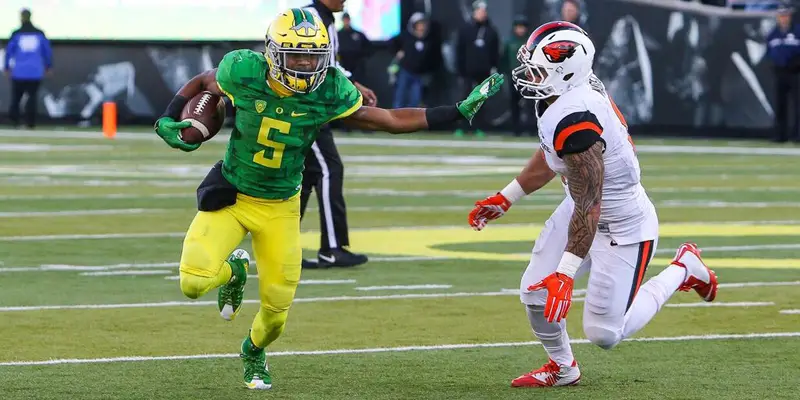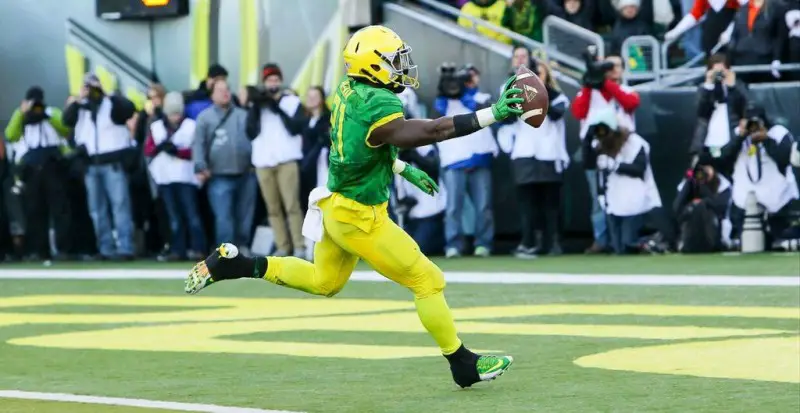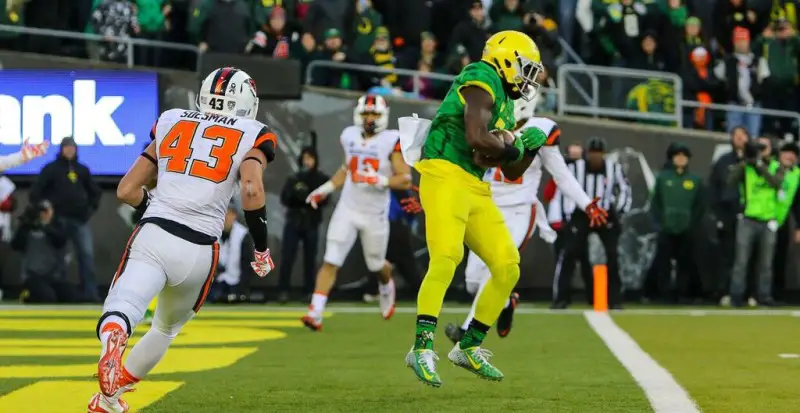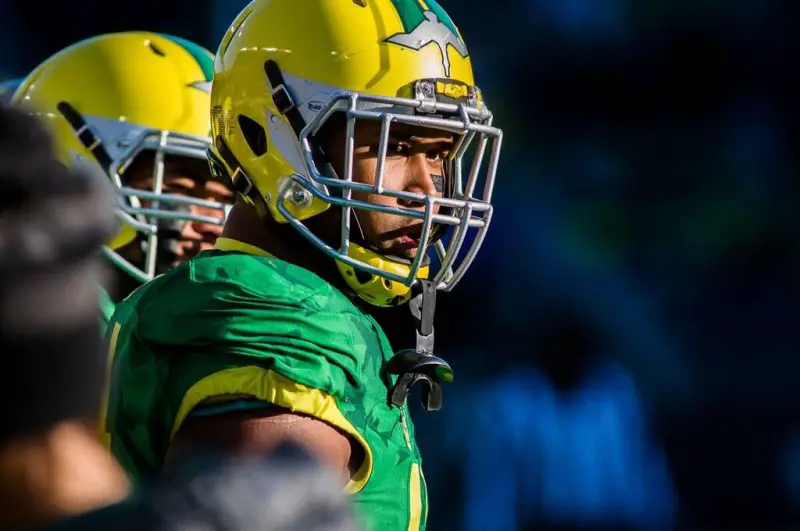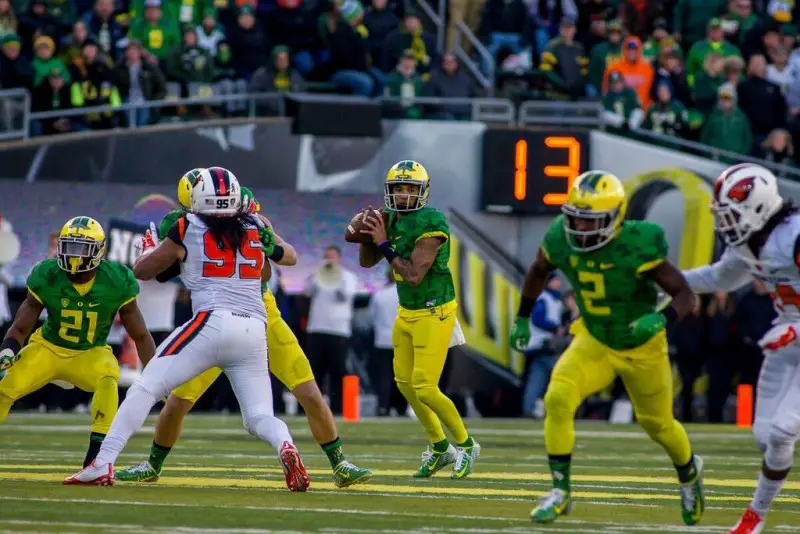Last weekend many teams across the country saw their entire season come down to a single game. USC-UCLA played for their division, Oklahoma-Oklahoma State played for a conference title, and Notre Dame-Stanford played for a shot at the Playoff. All were games for determining the success of the season for those involved.
Then there was the Civil War, a game that between teams whose seasons were already defined, but saw its teams put on a performance that was remarkably symbolic of their seasons.
For Oregon State, they went toe-to-toe against a top-20 opponent, looking competitive for half of a football game (although in their Stanford and Michigan games it was in the first half, not the second), before being eventually being outlasted by the better team. As for Oregon, stop me if this sounds familiar:
Hey, the Ducks are starting out well. No problem, we got this. Wait, we’re not doing well. Weren’t we doing well? Why aren’t we doing well? Things are ok now? We keep scoring, but so does the other team. And now that terrible call is going to cost us the game. No wait, it didn’t. Ducks win!
It was a fitting summary to Oregon’s 2015 season: It wasn’t great, it didn’t look perfect, and it may not have been a win in the way that many expected. But when it was over it was ultimately a success; and whatever fans wanted the most, they sweat the most to get.
Friday’s game was the most similar of all of Oregon’s games this year to its matchup with Washington, the win that started the Ducks on its current six-game winning streak.
After running out to a big leads at halftime, fans were feeling that the Ducks had put their rivals away early, only to watch those rivals slowly sneak back into the game. By the fourth quarter, they had people worried enough that fans thought “if they lose this game, this is the most excruciating way possible,” before the Ducks ultimately prevailed.
As the year progressed and the losses mounted, the wish list for Ducks fans this season began to edit itself. As hopes like “National Championship” and “Rose Bowl” began to fade from possibility, the bedrock wish list became simplified to “try not to lose to the Huskies and Beavers.”
Regression is an inevitable portion of the life cycle for any team in any sport. Yet for a program such as Oregon whose success at the highest levels of college football have been a fairly recent phenomenon, in a sport where success begets success and the only compensation for a season without success is furthered mediocrity, many Ducks fans are routinely terrified that any regression is a sign of Oregon’s successes falling off a cliff into a ravine of irrelevance.
There is a phrase for describing coaches hired for jobs with loaded rosters – it goes something to the effect of “they’re given keys to the Ferrari and told not to crash it.” While a phrase intended for coaches, it is one that works well for describing this year’s Oregon team as well. In a year when some rebuilding was acknowledged, just keeping the trajectory of the program on the road was a primary objective.
Fans remember the great teams, the ones who put trophies in the cases and whose victories create lifelong memories. But they also remember the terrible seasons, the ones of teams who quit before season’s end either by motivation or one injury too many; the ones fans deflect memory of by saying things like, “don’t even talk about that” or “I’m trying to forget.”
But they remember, because when one of those seasons comes along, they do everything in their power in their futile attempts to purge it from memory.
As the Ducks found themselves 3-3 at midseason’s point, the season could have gone one of two ways. For an Oregon program that has experienced plenty of second half heartbreaks, it wouldn’t be particularly shocking if the team had spiraled to poor finish. Instead, they did the opposite going undefeated in the second half of the season, finishing the regular season 9-3; with a win in their bowl game the Ducks would have an eighth consecutive 10-win season.
They did it with big wins over the Pac-12’s two division winners in back-to-back weeks, part of a nine-game November winning streak; the longest in the nation. That wasn’t the only streak this year’s team kept intact over the season’s second half.
They made it 12 in a row over Washington just a week after being at its lowest point following a loss to Washington State, and eight in a row over Oregon State even as the Beavers had made it a three-point game with less than five minutes remaining.
In Friday’s game they did what they had all year: They looked dominant at times, worrisome at others, and as they have done when in every game with a healthy Vernon Adams Jr., they eventually won.
That is the best way to define this year’s team: They had the keys to the car and didn’t crash it.
They veered, they swerved, they drifted, at times had trouble with staying in their lane, but in the end the car stayed on the road. They kept the momentum going down the road, and entertained everyone along the way.
The last time the Ducks lost three regular season games was 2008, when a late season surge built momentum for a conference championship the following year. If the Ducks can follow that blueprint, the finish to this year will be a big part of next year’s success.
Top photo by John Sperry.
Related Articles:
Why Oregon Football Always Belongs in the National Conversation
The B1G Won the 2026 Coaching Carousel...Big-Time!
Continuity? Lanning's Hiring Success is Put to the Test
Why Whether Dyer Was Down or Not...Doesn't Matter
How to Analyze Football Talent Like a Pro
Some Thoughts as the Football Withdrawals Kick In
Nathan Roholt is a senior writer and managing editor emeritus for FishDuck. Follow him on Twitter @nathanroholt. Send questions/feedback/hatemail to nroholtfd@gmail.com.

